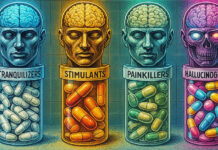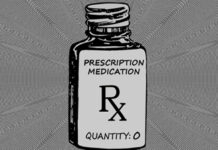Mental Health Survival Kit, Chapter 4: Withdrawing from Psychiatric Drugs (Part 4)
Psychiatrists have made hundreds of millions of people dependent on psychiatric drugs and yet have done virtually nothing to find out how to help the patients come off them again.
What Role Does Talk Therapy Have in Recovery from Psychosis?
In my graduate education, we were taught how to deal with a wide variety of human troubles — but one big exception was psychosis! For that, we were told to send our clients to the psychiatrist.
The NY Times: When Stimulants Are Bad
On Sunday, the New York Times ran a lengthy article titled “Risky Rise of the Good-Grade Pill,” and it illustrated, in vivid detail, how our society—and the medical community—may view a “drug of abuse” through one prism (as harmful) and a “prescribed drug” through another (as helpful), even though the drug in both cases is the same.
I Will Not Abandon You
My tipping point came last week after learning about the killing of 3 police officers in New Orleans, which had followed very shortly after the murder of five police officers in Dallas. I felt a deep and ancient fear and anxiety rumbling within. I wondered if others felt this tremblement de terre - this inner earthquake. My heart aches from the pain inflicted on others, as well as experienced by the individuals who acted out their fear in a murderous rampage.
Chapter Twenty-Six: Reaching the End, and Making a Start
A deep blue blanketing of 1AM sky envelops my car as I sit in my parents’ driveway in February 2010, pondering my next, last...
Critical Psychiatry Textbook, Chapter 16: Is There Any Future for Psychiatry? (Part Four)
On the failures of the publicly funded long-term studies and psychiatry’s fraudulent reporting of these results.
Simon Says: Happiness Won’t Cure Mental Illness
How do we distinguish between ordinary feeling down, on the one hand, and depression-the-illness on the other. Psychiatry's answer is that depression-the-illness causes " . . . clinically significant distress or impairment in social, occupational, or other important areas of functioning." This phrase occurs as a criterion feature in almost all psychiatric "diagnoses," and is embodied in the DSM definition of a mental disorder, but is unsatisfactory from a number of aspects. Firstly, the term "clinically" has no meaning, other than a thinly-veiled attempt to lend a medical flavor to the phrase. Secondly, the term "significant" is not defined, and inevitably rests on the subjective opinion of a psychiatrist, who, in many cases, has a vested interesting in "finding" a "diagnosis."
It’s All About Rights—or Should We Say “Unequal Privileges”
On May 26, MindFreedom will partner with “I Love You, Lead On” to host the fifth in an educational series to create cross-disability understanding of common themes and initiatives.
Compassion and Understanding Versus Drugs and Disease: Where Does Humanistic Psychology Stand Now?
Authors with lived experience of extreme states present a humanistic contrast to psychiatry.
Thoughts on “Antipsychiatry”
I have been called many things by many people over the last six years of my advocacy, and "Antipsychiatry" is, actually, one of the nicer ones. Yet, as much as I agree for the most part, I still I do not resonate with this term. While I completely identify with Antipsychiatry activists because of the abuse I have experienced and that of all the Survivors I know, I have felt pressured within "the movement" to take stands I don't agree with, and express opinions I do not hold. This makes no sense to me except to the extent that trauma often leads people to behave in the same ways as they themselves were abused.
Promoting Healing After Psychosis
It makes sense to be cautious about any kind of exploratory practice that might send someone who has been "psychotic" into another period of being lost and confused. But we should also beware the risk of trying to be too stable and "normal" after psychosis — the risk of avoiding the transformative work that might need to happen for that person.
An American History of Addiction, Part 4: “Drugs Are Bad”
The disease theory of addiction had been ingrained in our culture for 200 years when Nixon signed this law. But had we ever actually checked to see if it was all true?
Cognitive Behavioural Therapy Does Not Exist
Since the 1980s, a type of psychotherapy called Cognitive Behavioural Therapy (CBT) has become dominant. Like it or loathe it, CBT is now so ubiquitous it is often the only talking therapy available in both public and voluntary health settings. It is increasingly spoken about in the media and in living rooms across the country. Yet when we speak about CBT, what are we talking of? For CBT only exists - as we will see - as a political convenience.
Depressed, Anxious, or Substance-Abusing? But Don’t Buy You Are “Defective”?
Depressed, anxious, and substance-abusing people can beat themselves up for being defective. And psychiatrists and psychologists routinely validate and intensify their sense of defectiveness by telling them that they have, for example, a chemical-imbalance defect, a genetic defect, or a cognitive-behavioral defect. For some of these people, it feels better to believe that they are essentially defective. But the “defect/medical model of mental illness” is counterproductive for many other people—especially those “untalented” in denial and self-deception—for whom there is another model and path that works much better.
And You Thought They Were Side Effects: How Psychiatry Turned Chemical Disruption Into Medical...
There’s no cure beneath the disruption, just a chemical hit that alters perception or behavior.
A Discussion of Justina Pelletier and Boston Children’s Hospital
Justina Pelletier, who lived with her parents in Connecticut, had been diagnosed with mitochondrial disease, a rare and debilitating illness, and had been receiving treatment for this from Mark Korson, MD, Chief of Metabolism Services at Tufts Medical Center in Boston. In February of last year, Justina's parents took her to Boston Children's Hospital with flu-like symptoms. Dr. Korson had recommended an admission to Boston Children's so that Justina could be seen by Alex Flores, MD, a gastrointestinal specialist who had recently transferred from Tufts to BCH. But instead, Justina's care was taken over by the psychiatry department.
Announcing an International Symposium and Institute on Psychiatric Drug Risks and Withdrawal
I have given up on psychiatry as a system capable of “being there” for people who are dealing with life and death issues. Psychiatry as a system of care lacks validity. Every day — unfortunately — we learn of new examples proving this statement. But here's the good news: every day we meet people who show us that the predictions of psychiatry are not true; that there are “cures,” that it is possible to reduce or withdraw psychiatric drugs.
Post-Election Considerations for Users and Survivors of Psychiatry
A variety of scenarios of social and economic collapse have gone through many of our minds since Election Day. Insurance companies and pharmaceutical companies want to keep people on drugs, but what if there was no government subsidy for those who can’t pay?
Consent and Psychiatry: Problematizing the Problematic
It is rare to get involved in a dialogue over psychiatry without sooner or later someone defending the use of such “treatments” as ECT “as long as they are consented to,” with the term “informed consent” periodically employed. Herein lies the context for this piece. The issue that I want to probe, to be clear, is not whether force should be used—for of course it shouldn’t—but the thorny issue of consent itself—what exactly constitutes consent and what other issues besides consent are critical to factor in when considering what it is and is not legitimate for a “medical” professional to offer.
Ronald Pies Doubles Down (And Why We Should Care)
This past Saturday, I was on my way back from Europe to Boston, and while on a stop in Iceland, I checked my email and was directed to a new blog by Ronald Pies in Psychiatric Times, in which he once again revisited the question of whether American psychiatry, and the American Psychiatric Association (APA), ever promoted the idea that chemical imbalances caused mental disorders. And just like when I read his 2011 writings on this subject, I found myself wondering what to make of his post. Why was he so intent on maintaining psychiatry’s “innocence?” And why did it matter?
Introducing Our Blog
Consider these findings: The antidepressant drugs, used to treat depression and many other mental disorders have limited effectiveness, they have significant side effects, and...
Calling for Rep. McCann’s resignation while there is still time to run a different...
I am writing to suggest you run a different democrat in House District 8, Rep. McCann's district, because she has made herself unelectable and I would prefer that the seat remain in democratic hands. The reason for this is simple: Her sponsorship of HB1253 which represents an attempt to take the right to jury trial away from one million Coloradans. Please, Rep. McCann, do the party a favor and retire from public life to contemplate what in the world made you think going after the jury trial was a good idea in the first place.
Financial Stress: Auditing Our Money Woes
The American Psychological Association (APA) recently released its annual 2015 Stress in America survey. For the 9th straight year (since the survey began), financial issues were reported as the number one stressor in America. Even while many parts of the U.S. economy have shown a resurgence, many Americans are reporting that financial strain continues to take its toll, likely having significant effects on our health and well-being.
Saving Psychotherapy
Psychotherapy could, and really ought to, promote itself as the best investigative tool around for understanding emotional health and problems in living. That would change its footing, putting it on much more solid ground. I’m calling this redefined version of psychotherapy multi-lens therapy, to put the emphasis on where it ought to have been put all along: investigating.
Providing Sanctuary, Part 3; Support, Perfectionism, Structure and Flexibility
Sanctuary is a hot topic. It is applicable outside of mental health. I am learning that many, many, many people provide Sanctuary for a time in one way or another and for a number of different reasons. So I keep thinking about it and asking people about it, and I want to share more of what I am hearing and learning. The topics that seem to be "on top" for me right now are support, perfectionism, structure and flexibility.



















